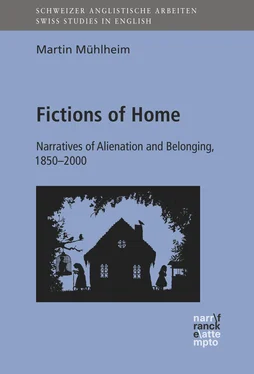Irony, the narrator insists, is not an ideologically neutral device, but suffused with implicit value-judgmentsjudgment; an “unsoftened” hut is far less hospitable to “light ironyirony” than a comfortable, wealthywealth home furnished with “velvet carpets.” Indeed, given the depthdepth of social injusticeinjustice (“deafening factories,” “the emphasis of want”), good society’s well-tempered beliefs appear curiously exorbitant (or “extremely moderatemoderation,” in the narrator’s elegantly oxymoronic phrase). Accordingly, it would be a profound mistake to think that holding strong beliefs necessarily indicates blind fanaticism, whereas a properly ironicirony distance goes hand in hand with intellectual subtlety and independence.116
In addition, the narrator’s argument also challenges the idea that ironyirony is necessarily subversivesubversion, for it is difficult to imagine that the tone of “good society” constitutes a counter-hegemonichegemony discoursediscourse. The narrator’s point is thus not far from an observation Franco MorettiMoretti, Franco makes when noting irony’s centrality in the history of the modern novel. How, MorettiMoretti, Franco wonders, could a stylistic device that has enjoyed almost unrivalled dominance in novelistic aesthetics simultaneously constitute a grave threat to the social ordersocial order ( Way of the World 97)? Rather than seeing the device as subversivesubversion, we should regard irony as a stylistic correlative to what MorettiMoretti, Franco posits as the great theme and political disposition of the BildungsromanBildungsroman : compromisecompromise ( Way of the World 10). This becomes more readily apparent if we examine MorettiMoretti, Franco’s definition of compromise: “We can speak of compromise when conflicting principles have indeed reached an accord, but without having lost their diversity. They remain heterogeneous, and the agreement intrinsically precarious” ( Way of the World 69). In agreement, but only precariously so – unified, yet remaining heterogeneous: it is a definition of compromise, but also a perfectly good description of how irony manages momentarily to unite fundamentally irreconcilable meanings: what Catherine Gallagher calls a characteristically modern “spirit of ‘ironicirony’ assent” (347).
Admittedly, The Mill on the Floss ’s critique of ironyirony is complicated by the fact that its narrator at the same time employs the device. There is irony, for instance, in the narrator’s description of the “fashionably drest [sic] female in griefgrief” as a “striking example of the complexitycomplexity introduced into the emotionsemotions by a high state of civilizationcivilization” (48; bk. 1, ch. 7). There is irony, too, in the narrator’s attitude towards little Maggie, who, after running away from home to join the gypsiesgypsies, mistakenly believes that she was really “gaining great influence over them,” and that the gypsies would want her to become their queen (92; bk. 1, ch. 11). And there is irony, to give a third and final example, in the narrator’s comments on the supposedly staggering backwardness of the past depicted in the novel:
All this, you remember, happened in those dark ages when there were no schoolsschool of design; before schoolmasters were invariably men of scrupulous integrity, and before the clergy were all men of enlarged minds and varied culture. In those less favored days, it is no fable that there were other clergymen besides Mr. Stelling who had narrow intellects and large wants, and whose income, by a logical confusion to which Fortune, being a female as well as blindfold, is peculiarly liable, was proportioned not to their wants but to their intellect, with which income has clearly no inherent relation. (139–140; bk. 2, ch. 4)
The surfacesurface meaning of the passage is that the narrator’s present is superior to the past, yet the idea that nowadays all schoolmasters are upright men, and all members of the clergy persons of enlarged minds and varied culture, is transparently excessiveexcess and, therefore, highly suspicious.117 Moreover, if taken at face value, the link made in the passage between “female” and “logical confusion” would sit uneasily with the novel’s general gender politics. In short, there is good reason to believe that the narrator’s comments are not in fact intended to praise the present, but instead to ridicule those who subscribe to an overly optimistic progressivism.
And yet, it is important to recognize that ironicirony distance towards a particular ideologyideology is not in fact the same as repudiating it. We have already examined some reasons why ironyirony is not necessarily subversivesubversion, and Slavoy ŽižekŽižek, Slavoj even suggests that “ideological identification exerts a true hold on us precisely when we maintain an awareness that we are not fully identical with it” ( The Plague of Fantasies 27). Accordingly, we might read The Mill on the Floss ’s use of irony as evidence of just how firmly the novel is committed to the liberal ideology of progressprogress from which it ostensibly distances itself. After all, the narrator states quite clearly that sufferingsuffering simply “belongs to every historical advance of mankind” (223; bk. 4, ch. 1; emphasis added). Suffering is, in other words, regrettable – but also an inevitable aspect of progress, which itself remains eminently desirable. Moreover, even according to the narrator’s own theory of irony, the novel’s use of the device would in fact mark The Mill on the Floss as yet another product of that ‘good society’ that depends on exploitationexploitation and widespread want. From either perspective, the novel seems curiously at odds with itself: satirizing the very ‘good society’ from which it has itself emerged, and embracing an idea of progress that, at the same time, it critiques through its pervasive mood of nostalgianostalgia.
Crucially, however, there is one respect in which Eliot’s novel increasingly abandons the respectablerespectability stance of ironicirony distance, namely in relation to its protagonist, Maggie. We have already seen that, when still a child, Maggie at times serves as the butt of the narrator’s ironyirony. However, as the novel’s heroine matures, the narrator identifies more and more uncompromisingly with her spiritual and emotional plight. Indeed, for F.R. LeavisLeavis, F.R. it is precisely this lack of ironicirony distance towards Maggie’s soulful yearnings that constitute the one great flaw of The Mill on the Floss :
There is nothing against George Eliot’s presenting this immaturity with tender sympathy; but we ask, and ought to ask, of a great novelist something more. ‘Sympathy and understanding’ is the common formula of praise, but understanding, in any strict sense, is just what she doesn’t show. To understand immaturity would be to ‘place’ it, with however subtle an implication, by relating it to mature experience. (485)
For LeavisLeavis, F.R., Eliot’s novel of educationeducation remains scandalously immature because it does not moderatemoderation its protagonist’s emotional intensity through properly ironicirony distance. In a similar vein, Virginia WoolfWoolf, Virginia complains that the narrator’s humor “controls” Maggie only as long as she is still a child, whereas this superior ironicirony poise is lost as the novel’s protagonist matures – and it is this that separates it from Middlemarch , which WoolfWoolf, Virginia has famously called “one of the few English novels written for grown-up people” (“George Eliot” 168–169). What upsets both LeavisLeavis, F.R. and WoolfWoolf, Virginia, in short, is that the narrator of The Mill on the Floss progressively – or, to their mind, regressively – abandons the mature tone of ‘good society,’ opting instead for a very unfashionable, emphatic identification with the adolescent heroine’s struggle.
Читать дальше












